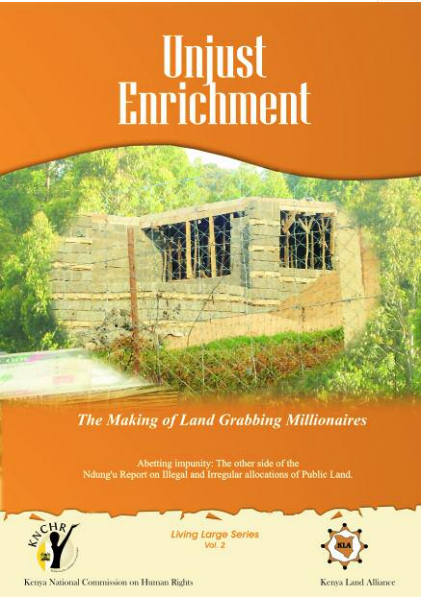The Kenya Land Alliance (KLA) is a not-for-profit and non-partisan umbrella network of Civil Society Organisations and Individuals committed to effective advocacy for the reform of policies and laws governing land in Kenya. KLA was founded in 1999 and registered as a Trust in 2001. The initiative to create an institutional framework for land laws and policy advocacy in Kenya was necessitated by the realization that the policy, legal and institutional framework created in 1950’s had become inadequate due to many changes in the social, political, economic and cultural fronts that had occurred in the country over the years.
The increased population has resulted in intense competition for access to land and natural resources. In addition, changes in the global environment brought about by globalization have combined to create a reality that is significantly different from the one existing when the
current framework was created in the 1950s. It is on this premise that KLA has been in the forefront in efforts towards effective advocacy for land laws and policy reforms in Kenya, as recently witnessed in the Presidential Commission of Inquiry into the Land Law System of
Kenya and the Constitution of Kenya Review Commission. Advocating for the formulation and implementation of a National Land Policy and review of land laws.
Our Vision
A society in which all people are assured of sustainable livelihoods through secure and equitable access and utilisation of land and natural resources.
Our Mission
To facilitate the activities of members by gathering and disseminating information towards an all-embracing, participatory and comprehensive land policy and law reforms in Kenya.
Members:
Resources
Displaying 46 - 50 of 76Unjust Enrichment. The Making of Land Grabbing Millionaires. Abetting Impunity: the other side of the Ndung’u Report on Illegal and Irregular Allocations of Public Land
Part of a series produced by KNCHR and KLA to enhance the protection of public resources and help the public demand greater accountability and transparency. Focuses on the plunder of Karura, Ngong Road, and Kiptagich Forests. Suggests a loss of public resources of Ksh.18.47bn. Offers an account of the human rights dimensions of land grabbing. Attempts to unmask those who did particularly well from the plunder. Urges the recovery of all monies unjustly got through illegal allocation of public land.
Unjust Enrichment. The Making of Land Grabbing Millionaires. Abetting Impunity: the other side of the Ndung’u Report on Illegal and Irregular Allocations of Public Land
Part of a series produced by KNCHR and KLA to enhance the protection of public resources and help the public demand greater accountability and transparency. Focuses on the plunder of Karura, Ngong Road, and Kiptagich Forests. Suggests a loss of public resources of Ksh.18.47bn. Offers an account of the human rights dimensions of land grabbing. Attempts to unmask those who did particularly well from the plunder. Urges the recovery of all monies unjustly got through illegal allocation of public land.
Challenges Facing the Implementation of the Forest Act 2005
The Kenya Land Alliance (KLA) welcomes the new Forest Act 2005 for placing forest resources at the core of sustaining both the local and national economies. Indeed locally forests are a source of food, fodder, wood fuel, construction materials, spiritual and cultural nourishment and traditional medicines among others. The Act, beyond highlighting the environmental and ecological functions of the forest sector, affirmsthe importance of our forest cover as one of the country’s major national assets, and this underscores the need to entrench it.
Unjust Enrichment-The Making of Land Grabbing Millionaires-Living Large Series
The illegal and irregular allocations of public land as chronicled in the Ndungu Report amount to a rip-off that dwarfs the Goldenberg and Anglo-Leasing scandals. Our analysis in this first issue in the series covers Karura, Ngong Road and Kiptagich forests and suggests a loss of public resources in excess of Ksh.18.4 billion. The Ndungu Report covers ten other forests as well as other public land, ranging from road reserves to cemeteries to public toilets and even State House land. As we cover these in future issues of the series, the cumulative loss will certainly be astounding.
A Survey into the Management and use of Wetlands in Kenya
The Role Of Wetlands In Poverty Reduction- Extreme poverty among rural poor people living around wetlands remains a daily reality for more than 56% of Kenya’s population, who subsist on less than one dollar a day. Seventy percent of extremely poor households, a majority of who live in rural areas where hunger and poverty prevails, are now being caught up in a new web of lack of access to wetlands as safety-net during hard times due to appropriation of wetlands by private developers.





